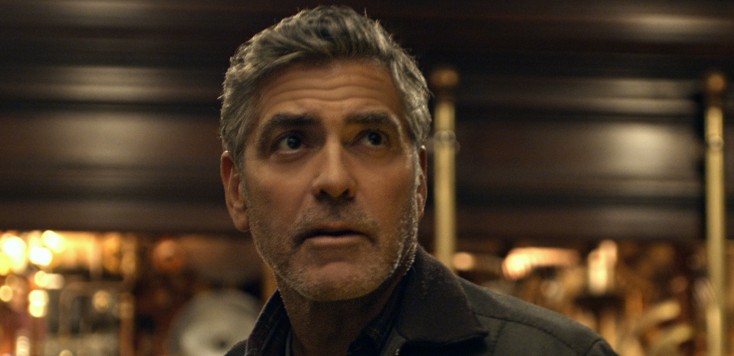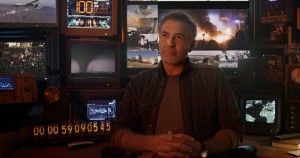By ANGELA DAWSON
Front Row Features
HOLLYWOOD—George Clooney plays a reclusive inventor who goes on an out-of-this world journey into the future with a teenager and a mysterious little girl in Disney’s “Tomorrowland.” Inspired in part by the Disney theme parks’ futuristic land of the same name, the film also takes a lot of inspiration from sci-fi classics like Steven Spielberg’s “Close Encounters of the Third Kind,” among others.
Directed by “The Iron Giant’s” Brad Bird, who also served as one of the screenwriters, the film also stars Hugh Laurie (“House”), Britt Robertson (“Under the Dome”), Raffey Cassidy (“Snow White and the Huntsman”) and country music artist Tim McGraw in the effects-laden film.
One of the most beloved celebrities in the world, Clooney attracted nearly 200 journalists and bloggers from around the globe to a recent press conference event in Beverly Hills, Calif. Handsomely dressed in a black jacket, black shirt and trousers, the affable Clooney tried to keep the questions focused on the family-friendly film. He carefully dodged the question of whether he and new wife Amal Ramzi Clooney, a high powered international lawyer, are expecting a baby. He cajoled and encouraged his young co-stars Robertson and Cassidy, who are less experienced with the probing press, to talk about their moviemaking experience, but he did offer up some new details about his jet-setting life.
Q: Do you see this as a bold film?
Clooney: Putting me in a summer movie is a very bold thought. First and foremost I think it’s a really bold thing for Disney to be willing to do a film that isn’t a sequel and isn’t a comic book (movie) and truly invest in a summer film of this sort of ilk. The fun part of it to me was when (I) read the screenplay, although I have to say, just so we’re clear, when Damon (LIndelof) and Brad (Bird) showed up at my house, they said, “We’ve got a part we’ve written for you.” And then I opened up the description of the character: a 55-year-old has been. I’m kind of going, “Wait, hey, hey, hey, hang on a minute. Which part am I reading for?”
Q: You’re character’s a genius, right?
Clooney: A former genius, boy genius who’s gotten bitter in his old age. But I just loved the idea of, we live in a world right now where you turn on your television set and it’s rough out there and it’s not fun, and can really wear on you after a period of time. We see generations now feeling as if it’s sort of hopeless in a way. What I love about it is it sort of speaks to the idea that your future is not preordained and predestined, and that if you’re involved, a single voice can make a difference and I believe in that. I happen to believe in it so I love the theme of the idea that there’s still so much that we can all do to make things better and I liked it. I thought it was great.
Q: Does the grumpy cynic reflect your struggle, and do you relate to that in the context of this movie?
Clooney: I actually grew up during the Cold War period and I always found that although we always thought that the world would end in a nuclear holocaust at some point, everybody was pretty hopeful. There were an awful lot of things going on that you felt you could change. I grew up in an era where the voice, the power of the one really did feel as if it mattered.
We had obviously the riots that are reminiscent of the things we’re looking at today but we had the Civil Rights Movement and we had Vietnam and we had the Women’s Rights Movements, and all those things that you felt you could actually have some part of changing. And actually if you look at the things that changed in the ‘60s and early ‘70s, individual voices did make a huge difference. It wasn’t governments doing it necessarily. So I didn’t ever have that great disappointment in mankind. I always felt like it’s going to work out in the end and I still feel that way. So what I loved about the film was that it reminds you that young people don’t wake up, they’re not born and start out their lives cynical or angry or bigoted. You have to be taught all of those things.
I watch the world now and think well, I see really good signs from young people out there and I feel as if the world will get better. I’ve always been an optimist. I’ve been a realist but I’ve been an optimist about it. I really related to the film because Brad and Damon want to tell a story that’s an entertainment because first and foremost, it has to be an entertainment, but that is hopeful. And I’ve always felt that way myself so I didn’t have any great conflict with it.
Q: Is there a Disney attraction based on the movie “Tomorrowland” in development? What would you hope that would be? Co-writer Damon Lindelof (“Lost”) said you would want to pitch jetpacks.
Clooney: That’d be a great ride.
Q: You could fly around the Disney park. Now that they serve alcohol there, that wouldn’t be a great idea, though, would it?
Clooney: I’m also not thrilled with the idea of people in jetpacks flying over my house. (He makes a swatting motion.) “Heyyyy. Heyyy.”
Q: Damon also said he and the other writers initially wrote you in with a sequence of paparazzi robots that attacked his house but they cut that scene.
Clooney: That was nice (of them).
Q: Would you like to know your future? Since it’s Mother’s Day this weekend, do you see yourself as a father?
Clooney: (smiling) I knew you were going to get to it somehow. I didn’t think you’d go the Mother’s Day route. I thought you’d do, “There was a little kid who’s you as a young boy. Does it make you feel like you want to have a little boy like that boy that looks like you sort of, like having a child?” But no, you went the “You know, you have a mother and most of us have mothers and wouldn’t you like to be a father?” Thank you for asking.
Q: What would it take to make this world better?
Clooney: You end up participating in whatever way you can. I think there’s a funny thing about careers in a strange way which is as you’re working, you find that as time goes on and as you become more comfortable in your career path and things are starting to make sense and it’s not just about trying to work, you’re able to focus on other things and other people, particularly in this line of work where there’s a lot of attention focused on you that you don’t really need. You try to just turn that focus and put it on places.
I have places obviously that matter to me like in sub-Saharan Africa and places that matter. I’ve been involved in lots of those things and Tim can speak to this too because there’s an awful lot that we all have to do to participate and we try to as much as possible, we’re not policymakers, so what we really need to do is try to shine a light on people who really don’t get light shone upon them.
Q: Your co-star Tim McGraw said, he thought the best way is to use whatever you have, whatever cache you have as a celebrity to be a mirror for these sorts of things, to cast light.
Clooney: I agree.
Q: There is a rumor that you were rapping between takes. How are your rapping skills?
Clooney: They’re well known. In fact, many of the great rappers today have fashioned their stylings from me. I was 18 when the Sugar Hill Gang hit the scene, so it’s funny because you’re literally at the actual oldest age of anybody that knows those songs. But I do still sing them every once in a while to entertain the troops when they think it’s really getting — they think oh gosh, we’re in the water, it’s cold, we’re shooting 14 hours, we’ve been out all night, it’s terrible, what could be worse? And then I rap.






